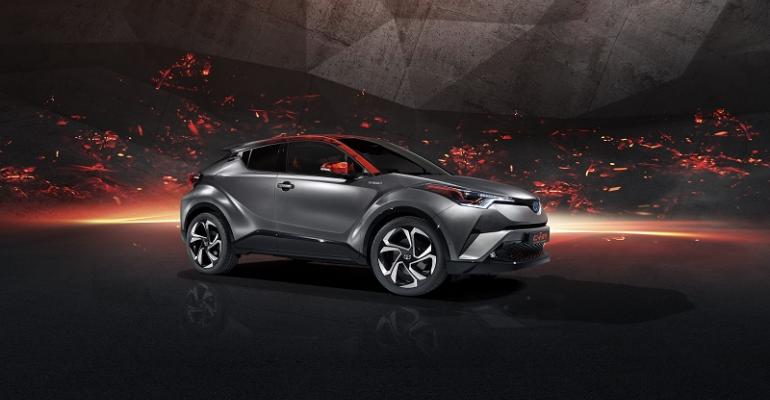FRANKFURT, Germany – After a decades-long slog, Toyota is catching fire in Europe.
The automaker’s registrations in the European Union rose 15.4% through August to 469,977 vehicles, one of the strongest spikes for any automaker in the group this year. The Toyota brand alone is up 16.4%, the fourth-highest increase in the EU this year after Alfa Romeo, Lada and Suzuki, European Automobile Manufacturers’ Assn. data shows.
Driving the Japanese automaker’s results upward after years of slower growth than in the U.S., is a strong and growing acceptance of hybrids in the EU and Western Europe.
In first-half 2017, 40% of Toyota’s sales mix in Europe, and 50% of the mix in Western Europe, comprised vehicles with hybrid powertrains. The automaker has a goal for hybrids to make up 50% of its annual sales in Europe by 2020.
How did it happen? Relentless references to hybrid, says a Toyota Motor Europe official.
“We’ve set ourselves up as the hybrid company for many years in Europe. We try to get (the phrase) ‘Toyota hybrid’ into the marketplace, and get people to not just say just ‘hybrid’ but ‘Toyota hybrid,’” Mark Adams, vice president-Business Transformation tells WardsAuto at the 2017 Frankfurt auto show. “All of our marketing is in the direction of hybrids. If you go on our website, if you look at any of our TV commercials…it’s all about hybrid. And it’s not many Priuses (we’re selling). It’s the locally produced cars.”
Toyota builds hybrid variants of the Yaris subcompact car, Auris compact car and C-HR compact CUV in France, the U.K. and Turkey, respectively, while it imports the Prius, as well as Lexus hybrids, from Japan.
The increasing demand for hybrids in Europe, which also is being driven by government incentives, particularly in the Netherlands and the U.K., has Toyota exploring locally assembling the hybrid powertrains for those European-built gasoline-electric models, Adams says.
“What we do need to do with the volumes so high is consider localization of the hybrid powertrain…That’s very much something that we’re looking at,” he says.
A negative perception of diesels, prompted by two years of headlines relating to emissions-cheating scandals by Volkswagen and others, undoubtedly is helping propel consumer acceptance toward hybrids, but Adams says Toyota is “not being opportunistic over that situation.
“Obviously (there is) something of a pushback against diesel because of the publicity. But our hybrid journey started a long time ago and we’ve not wavered.”
He cautions diesel engines still have a place in the market, including in larger vehicles such as the refreshed Land Cruiser SUV on Toyota’s stand here. But in certain segments, particularly smaller cars, the shift away from diesel is apparent.
“Our hybrid sales in those segments are outstripping the diesel sales. So the market speaks for itself,” Adams says.
In line with proclamations from senior Toyota leadership in Japan, the automaker expects to retail its first all-electric vehicle in Europe sometime in the next decade, and, in a time of blaring headlines about shifts toward fully electrified lineups, already considers itself a leader in electrification.
“I think we’d even be as bold (as) to say we started the road to electrification with hybrid all those years ago,” Adams says, noting he joined Toyota in 1992 and on his first trip to Japan viewed a Prius prototype with thoughts even within the company of whether it would catch on. “I should also say we see today’s hybrid technology as electrification.”
At the Lexus brand, the shift to hybrids is even stronger. Some 99% of its Western European sales in the first half of this year were hybrids.
Yet Adams says Lexus, which still is a small player in the luxury sector in Europe with just 27,501 passenger-car registrations in the EU through August compared with 572,032 for Mercedes, isn’t ready to move toward a fully electrified lineup devoid of pure gasoline or diesel engines, as Jaguar Land Rover and Volvo say they will.
“We’re almost there…(but) some customers take a while to acclimatize to hybrid,” he says, adding Lexus still sees a group of buyers it needs to educate about the powertrain. For that, the brand relies on its marketing activities, including demonstration drives.
At the Frankfurt show, TME CEO Johan Van Zyl announces Toyota intends to offer a hybrid emphasizing driving dynamics for each core model in its lineup, alongside current hybrid offerings oriented toward efficiency and fuel economy. Toyota displayed a concept C-HR hybrid, dubbed the Hy-Power, reflecting the goal.
Van Zyl says more information will be revealed early next year regarding the introduction of sportier hybrids in Europe.





